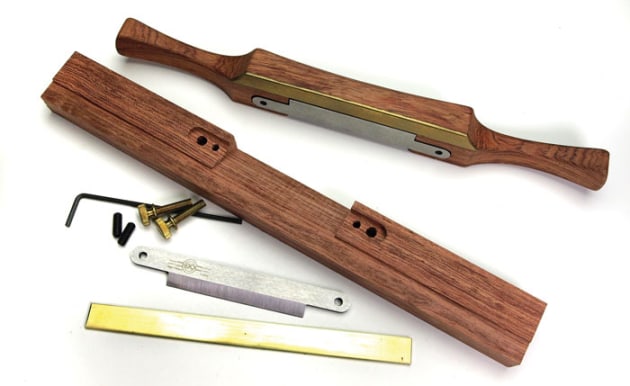The Shaper: quality spokeshave options
Words: Raf Nathan
Better than sex. That’s what someone said to me on trying out a spokeshave for the first time. Now I don’t know about you, I do like a good spokeshaving, but for me it’s not that good. However the point here, is that spokeshaves are both practical and a pleasure to use.
A spokeshave is virtually a chisel held in a small metal guide with handles. As the name suggests they derive from 16th century wheelwrights using them for forming wheel spokes. In archaeology though, a spokeshave is an instrument for cutting stone.
Traditional wood-bodied spokeshaves have the blade at a low angle. The blades, fitted bevel up, have two tangs that fit into the body with adjustment done by tapping the blade. You can still buy versions of these or make your own from kits.
Spokeshaves vary in action depending on the sole shape. Most common is a flat sole. Curved soles suit shaping concave curves; they are harder to use but give good results. There are also concave and convex shaves suited to spoke work or internal shaping.
Set up
The key of course, as with all cutting tools, is to have a sharp blade set up properly. Most shaves are bevel down with a small cap iron and single locking screw. Adjusting the depth of cut is by tapping the blade on either side, or better tools have one or two thumbwheels to advance or retract the blade.
The general opinion is that thick blades give better results it seems, so be wary of blades less than 2 or 2.5mm thick.
The mouth opening should be reasonably fine, however depending on the tool make and your spokeshaving style, you may need to open the mouth with a small file. A mouth that is too large ex-factory is a problem. You can shim a blade
forward but it’s a fiddly process. Most have a 2” (50mm) wide blade but this varies, the HNT Gordon for example has a 45mm wide blade.
We are now fortunate to have a massive choice of metal-bodied spokeshaves made by various toolmakers that are more refined than the older style. The reason some are more expensive than others is accuracy of machining, blade thickness and quality. You can make a cheaper shave work well but the bed and mouth may well need tuning with a file, not an easy job.
There are many shaves offered on the web ranging in price from $15 up. My experience with buying cheap eBay things is not good and quality will repay its own cost in the long term. Here is a survey of some of the best tools in this class around.
Prices quoted were correct at time of writing. Photos courtesy of manufacturers/suppliers shown.
Cast Iron
This Pinnacle tool is a Woodcraft branded shave that comes as flat or curved sole. It’s an impressive cast iron tool with twin adjusters and 2” wide blade. See www.woodworksupplies. com.au
Everyday Users
Veritas make seven spokeshaves. The smallest is a Preston style shave in cast stainless steel, although it only comes as a curved sole version.

They do have a low angle tool based on traditional wood ones but made from cast aluminium with an adjustable mouth effecting depth of cut and they also have a wooden spokeshave kit.
What most woodworkers should consider are the flat, curved and concave shaves with metal bodies and wood handles. The bodies are ductile cast metal with comfortable wood handles. The 2-1/8” wide and 3.2mm thick blades are adjusted by twin brass screws. My preference is for the flat sole version. Veritas also make an extra large 2-1/2” shave as well as three smaller shaves called ‘chair devils’ for shaping parts. See www.carbatec.com.au
Design Collaboration

Lie-Nielsen make five different shaves. Their smallest is a great looking Small Bronze Spokeshave, based on a Preston design that is available with a flat or curved sole.
A collaboration between Boggs and Lie-Nielsen produced their concave shave ideal for spindle work. The Brian Boggs spokeshave weighs a hefty 12 ounces with either a flat or curved sole. These have a beautiful bronze body and cap with hickory handles and a 2” blade 3.2mm thick. These are all wonderful tools although there is no thumbwheel adjustment for the blade. Find these at www.lie-nielsen.com.au
Custom Make
This is a low angle shave you build yourself and comes with a pre-machined bubinga body with all fittings, brass wear- plate and a legendary Hock blade supplied. You assemble everything and shape the handles, just as you like. The Hock Tools spokeshave kit is sold by www.woodworksupplies. com.au
Polished Tradition

Clifton offer four shaves – flat, curved, concave and convex. These are made from a malleable iron beautifully polished and come with a cryogenically treated 2” O1 steel blade. Clifton are a respected name in the British toolmaking tradition available from www.beyondtools.com.au
Raf Nathan is a furniture designer and maker who lives in Brisbane. Learn more at www.interwoodshop.com.au




